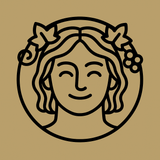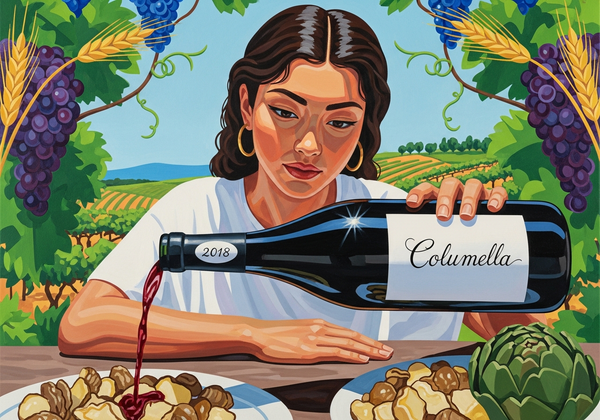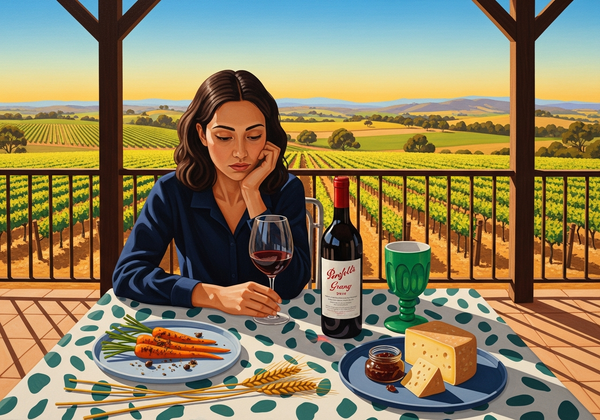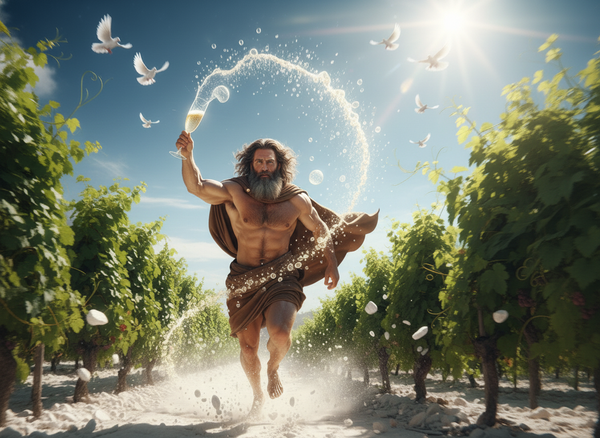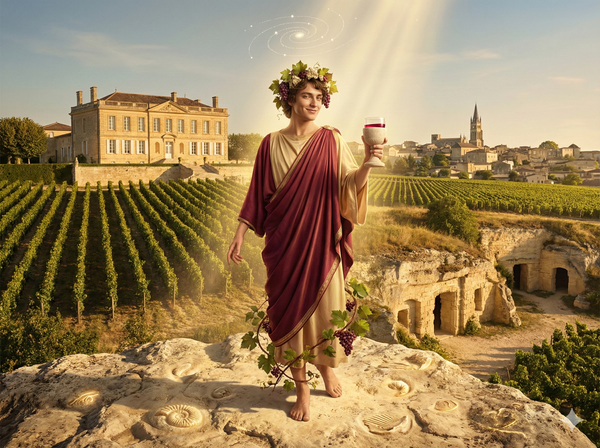Electric Riesling: The Enlightened Chaos of Dr. Loosen
Explore the story of Dr. Ernie Loosen — the visionary who revived Germany’s Mosel with electric, world-defining Rieslings. A philosopher turned winemaker, Loosen blends intellect, tradition, and joy to craft wines that shimmer with life and lightning.
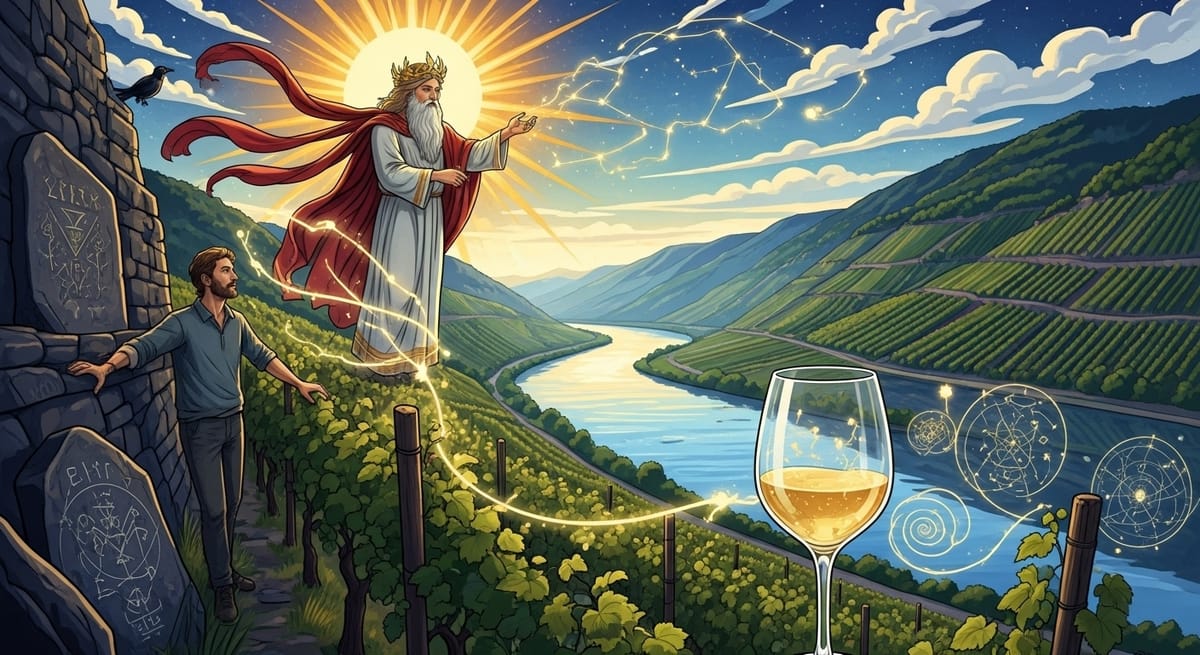
How a philosopher from the Mosel turned German precision into pure, liquid poetry.
The Spark in the Slate
The Mosel is not a gentle place. It is a cathedral of cliffs, a landscape of impossible angles, where the vines cling to slate as if grasping for salvation. It is here — on those vertiginous slopes above the river — that I, Liber, have watched the mortals toil for centuries. And among them, none have toiled with quite as much brilliance, mischief, and devotion as Dr. Ernie Loosen.
Born into one of Germany’s oldest wine families, Ernie was supposed to inherit the estate quietly, as the dutiful son of generations before him. But Loosen was never one for quiet inheritance. He was a philosopher first — a student of archaeology and literature — before he ever became the high priest of Riesling.
It was as if Dionysus and Socrates had conspired to make one man.
The Doctor Who Disobeyed
When Ernie returned to the Dr. Loosen estate in the 1980s, the Mosel was in decline. Germany, once famed for its exquisite Rieslings, had become known for supermarket sweetness. Vineyards that once produced kings’ wines were languishing in mediocrity.
Most heirs would have followed the path of least resistance. But Ernie — ever the contrarian scholar — asked a different question: What if the past still held the truth?
So he did what the best heretics always do: he looked backward to move forward. He studied the forgotten ways of his ancestors — old vines, ungrafted rootstocks, minimal yields, long lees aging — and revived them with monastic intensity.
When others chased modern efficiency, Ernie chose ancient chaos.
The Resurrection of Riesling
The result? Electricity in a bottle.
Loosen’s wines pulsed with energy — dry yet luminous, powerful yet precise. His Wehlener Sonnenuhr, Ürziger Würzgarten, and Erdener Prälat Rieslings became symphonies of slate and sunlight. Each vineyard expressed its own dialect, each bottle a philosophical argument for terroir.
And yet, Ernie’s genius was not in austerity, but in joy. His wines had vitality, that untranslatable spark — they danced rather than marched. To drink one was to feel both enlightenment and abandon, as if Goethe himself had joined a revel in the vineyards.
By the 1990s, Dr. Loosen had become synonymous with the Mosel’s rebirth. Critics called him a “visionary.” I call him what he is: a prophet with a corkscrew.
A Global Mission: From the Mosel to the World
But Ernie was not content to stop at resurrection. Like all great thinkers, he had the zeal of the evangelist.
He took his Rieslings on the road — to London, New York, Tokyo — pouring them not as luxury, but as enlightenment. He taught a generation of drinkers that sweetness is not sin, that acidity is the soul, and that Riesling is the philosopher’s grape.
He built collaborations that defied borders:
- With Chateau Ste. Michelle in Washington, he created Eroica, a wine that bridged continents.
- With J.L. Wolf in the Pfalz, he explored the lush side of German terroir.
- And through seminars, festivals, and relentless travel, he became the face of modern German wine — charismatic, unpretentious, and contagiously passionate.
His mission was never just to sell bottles; it was to restore faith — in craft, in patience, and in beauty itself.
The Philosophy of Fermentation
Unlike many mortals, Ernie speaks of fermentation as one might speak of religion. He believes wine is not “made,” but revealed — the winemaker’s duty is not control, but conversation.
He treats vineyards as living libraries. Every slope, every vine, holds memory; the soil is the text, and Riesling is the language through which it speaks.
In the cellar, he works with minimal intervention: wild yeasts, long aging on the lees, large old oak casks that breathe like lungs. “Wine,” he often says, “should taste of where it comes from, not of who made it.”
That is the creed of a true disciple of mine — for I, too, have always loved those who create not for ego, but for eternity.
Liber’s Reflection: The Divine in the Details
What makes Dr. Loosen remarkable is not only his intellect, but his playfulness — that divine paradox of discipline and joy.
He has shown the world that precision and passion are not enemies. That the sharp edge of acidity can coexist with the voluptuous touch of fruit. That wine, at its best, is not a product — it is a conversation between time and truth.
To stand in his vineyards on a misty Mosel morning is to feel the hum of creation itself — vines gripping slate, clouds drifting like thought, and somewhere in the distance, the echo of laughter.
For in every great wine, there must be laughter.
And so, when I, Liber, raise my cup to Ernie Loosen, I do so with reverence and delight — for here is a mortal who has not only studied the past but made it sing again.
He has proven that the soul of Riesling is eternal, that tradition is not a prison but a prayer.
And that sometimes, enlightenment comes not from the heavens — but from a slope of slate, kissed by rain, and coaxed into glory by the hands of a joyful philosopher. 🍷

